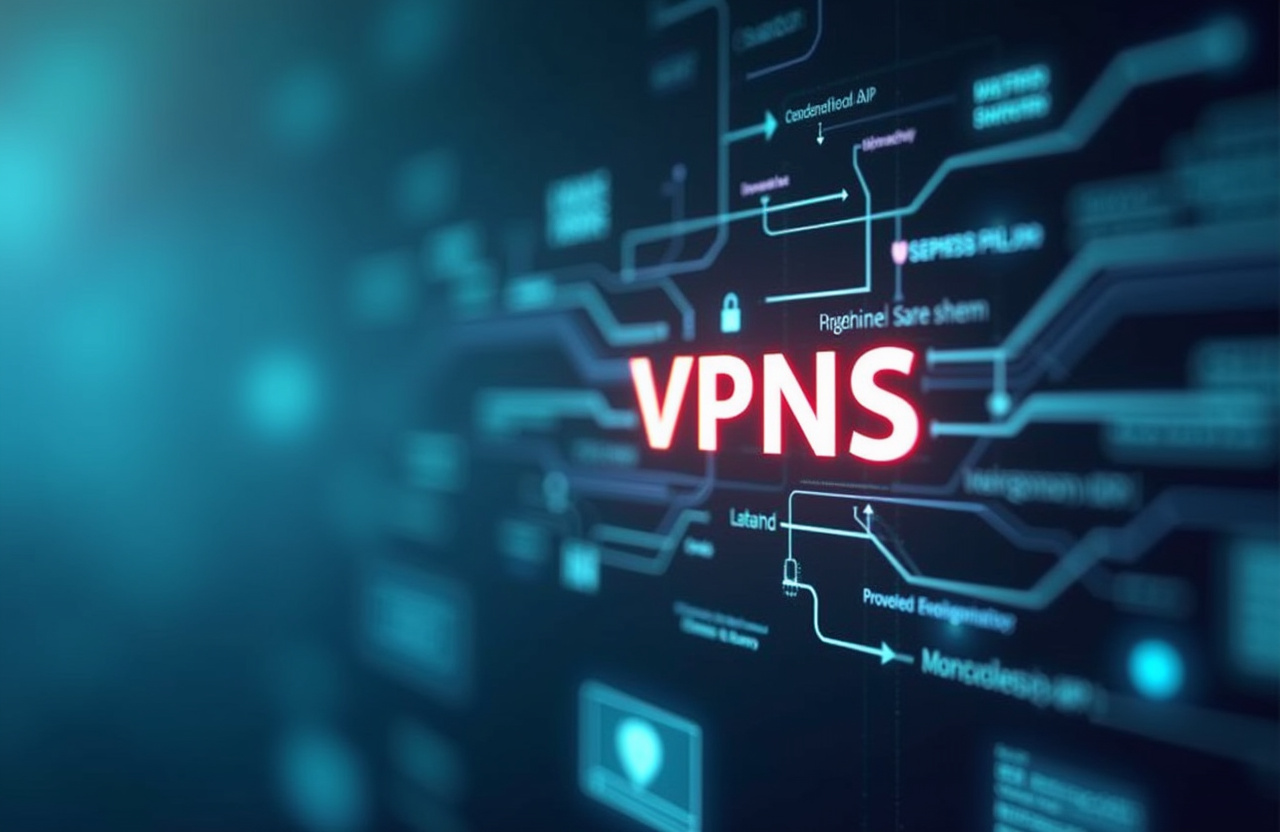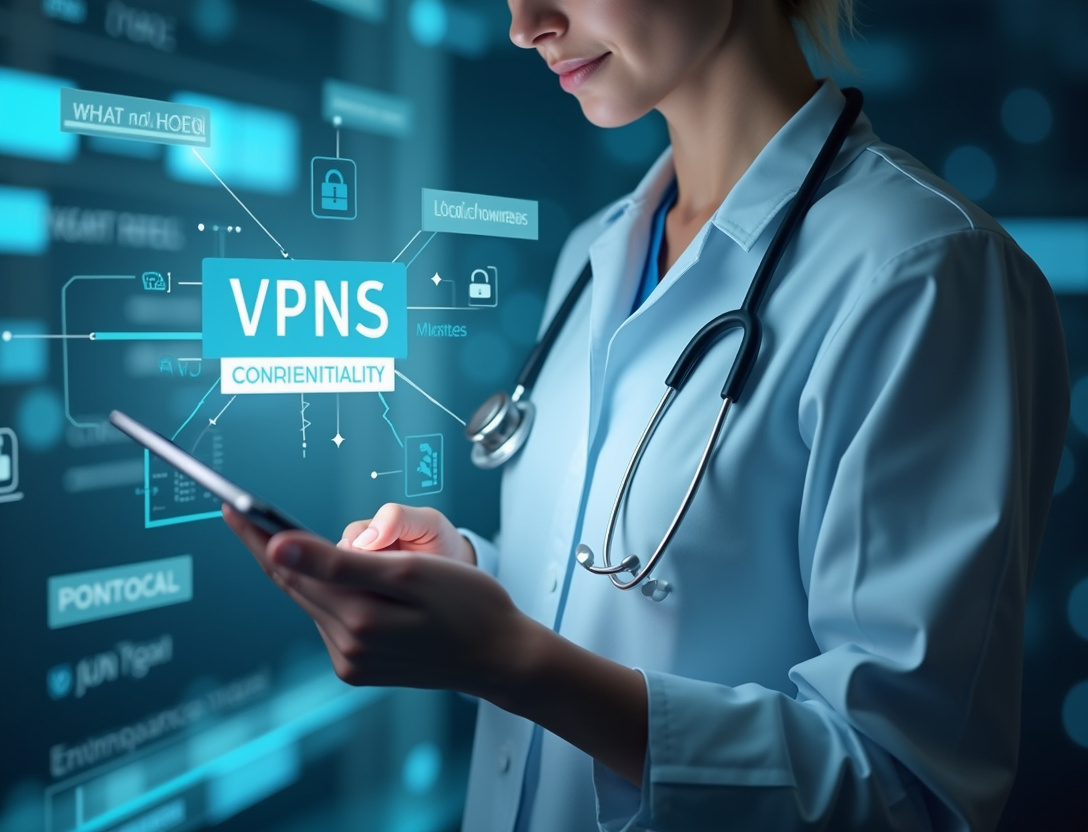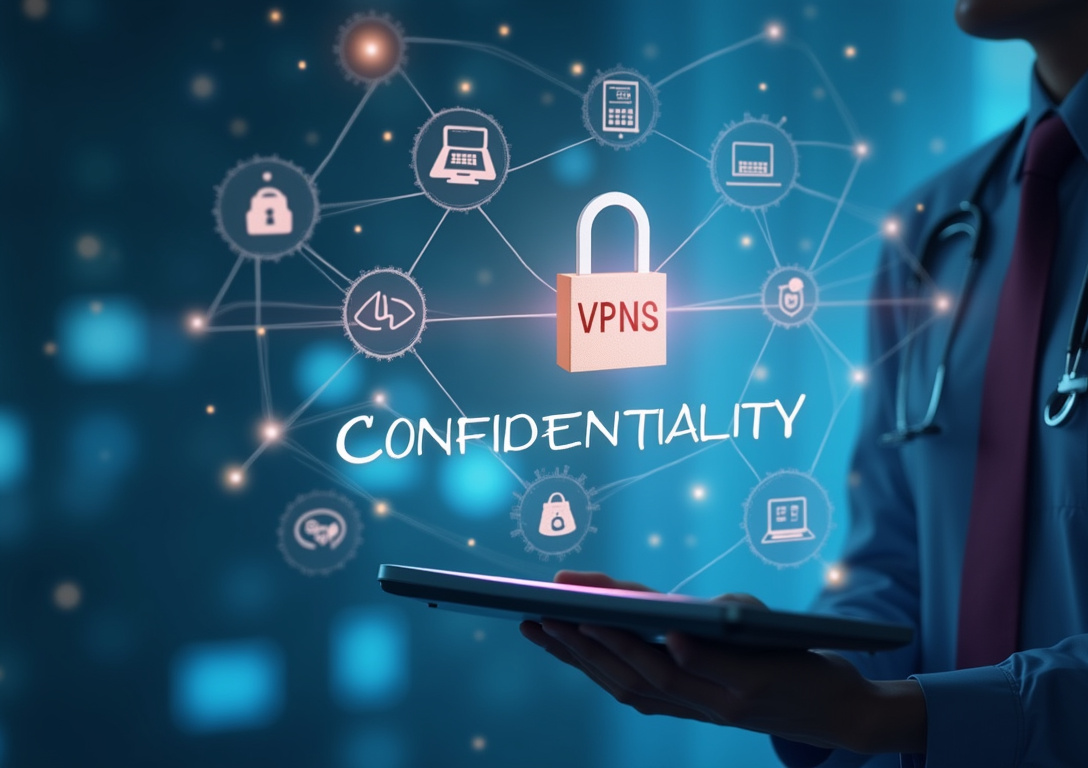VPNs for Digital Health Platforms: Ensuring Secure Patient Access

Table of Contents
VPNs for Digital Health Platforms: Ensuring Secure Patient Access
The digital revolution has transformed healthcare, bringing unprecedented convenience and efficiency through telehealth, remote monitoring, and electronic health records (EHRs). However, this digital shift introduces significant security and privacy concerns that must be addressed to maintain patient trust and adhere to stringent regulations. At the heart of secure digital healthcare lies the necessity for robust data protection, and Virtual Private Networks (VPNs) have emerged as a pivotal technology in achieving this goal.
This article explores the critical role of VPNs in safeguarding digital health platforms, focusing on how they ensure health record protection, contribute to compliance with healthcare regulations, and ultimately provide secure patient access to vital healthcare services. As healthcare providers increasingly rely on digital tools to manage patient information and deliver care, the vulnerability of sensitive data to cyber threats has become a pressing issue. The potential consequences of a data breach in the healthcare sector are severe, ranging from financial penalties and reputational damage to the erosion of patient trust.
Therefore, implementing effective security measures is not only a regulatory obligation but also an ethical imperative. A key function of a health VPN is to establish a secure, encrypted connection between a user's device – whether it's a doctor's laptop, a nurse's tablet, or a patient's smartphone – and the digital health platform. This encrypted tunnel acts as a protective shield for all data transmitted, rendering it unreadable to unauthorized parties who might attempt to intercept it.
Consider a scenario where a patient accesses their EHR through a public Wi-Fi network at a coffee shop. Without a VPN, their login credentials, medical history, and other sensitive data could be vulnerable to hackers lurking on the same network. By using a health VPN, the patient's connection is encrypted, ensuring that their data remains confidential and secure.
The benefits of a VPN extend beyond secure access on public networks. They also play a crucial role in protecting data during remote access, which is increasingly common in modern healthcare. Doctors and nurses often need to access patient records from their homes or while traveling.
A health VPN allows them to do so securely, without exposing sensitive data to potential threats. By masking the user's IP address and encrypting all traffic, VPNs effectively anonymize online activity, making it difficult for cybercriminals to track and target healthcare professionals. This is particularly important for healthcare personnel who may be handling highly confidential patient information.
The concept of "secure patient access" encompasses not only protecting data in transit but also ensuring that only authorized individuals can access sensitive health information. VPNs can be integrated with other security measures, such as multi-factor authentication and access controls, to provide an additional layer of protection. For instance, a healthcare provider might be required to use a VPN, along with a password and a one-time code sent to their mobile device, to access patient records.
This combination of security measures significantly reduces the risk of unauthorized access. By implementing these measures, digital health platforms can demonstrate their commitment to protecting patient data and upholding their privacy obligations. As digital health platforms continue to evolve, VPNs will play an increasingly vital role in ensuring the security and privacy of patient data which ultimately foster a trust relationship.
Beyond simply encrypting data, VPNs are integral to adhering to the complex web of regulations governing digital health platforms. Compliance, particularly with laws like HIPAA in the United States and GDPR in Europe, necessitates robust security measures to protect patient data. VPNs offer a crucial layer of protection, aiding healthcare organizations in meeting these stringent regulatory requirements.
The Health Insurance Portability and Accountability Act (HIPAA) mandates that Covered Entities and their Business Associates implement a range of safeguards, including technical, administrative, and physical measures, to protect Protected Health Information (PHI). Technical safeguards, such as encryption, access controls, and audit trails, are particularly relevant to the use of VPNs. By establishing a secure, encrypted connection for accessing and transmitting PHI, VPNs directly address HIPAA's requirements for protecting data in transit.
This is especially important in scenarios involving remote access to patient records or the transmission of data over public networks, where the risk of interception is higher. A VPN ensures that PHI is shielded from unauthorized access, even if a device is compromised or a network is breached. Similarly, the General Data Protection Regulation (GDPR) imposes stringent requirements on organizations that process the personal data of EU citizens, regardless of where the organization is located.
This has significant implications for digital health platforms that serve patients within the European Union. GDPR mandates that organizations implement appropriate technical and organizational measures to ensure the security of personal data, including protection against unauthorized or unlawful processing and against accidental loss, destruction, or damage. VPNs can contribute to GDPR compliance by providing a secure and encrypted channel for accessing and transmitting personal data across international borders.
This is particularly important for organizations that operate in multiple countries and need to transfer data between different jurisdictions. The use of a VPN helps to ensure that personal data is protected from interception and unauthorized access during transit, regardless of the geographical location of the user or the server. Demonstrating compliance with HIPAA, GDPR, and other relevant regulations requires more than simply implementing security technologies like VPNs.
It also necessitates a comprehensive approach that integrates security protocols into organizational policies, procedures, and training programs. Healthcare organizations must establish clear guidelines for data access, usage, and storage, and ensure that all employees are trained on these guidelines. Regularly reviewing and updating security policies is crucial to address emerging threats and evolving regulatory requirements.
Implementing VPNs without corresponding policies and training can create a false sense of security. The lack of proper protocols for usage, data handling, and incident response can negate the benefits of VPN technology. Employees must understand how and when to use VPNs, the importance of maintaining secure passwords, and the procedures to follow in the event of a security breach.
By integrating VPNs into a holistic security framework, healthcare organizations can effectively demonstrate their commitment to protecting patient data and meeting their legal obligations. Data Loss Prevention (DLP) strategies can further protect sensitive health information, adding another layer of security and reducing the chance of accidental leaks. Compliance is not merely a legal obligation; it is also a matter of building trust with patients.
Patients are more likely to entrust their healthcare providers with their personal information if they believe that their data is being protected. By prioritizing data security and demonstrating a commitment to compliance, digital health platforms can foster a culture of trust and enhance their reputation within the healthcare community. The failure to meet compliance standards can result in severe legal penalties, financial losses, and reputational damage.
Therefore, investing in security measures like VPNs and implementing comprehensive compliance programs are essential for the success and sustainability of digital health platforms. Regular audits and vulnerability assessments further ensures that measures deployed are effective and up to date.
Selecting the appropriate health VPN for a digital health platform necessitates a meticulous evaluation of several key factors. The market offers a diverse range of VPNs, but not all are created equal, particularly when it comes to safeguarding sensitive health information. A robust VPN solution for healthcare should prioritize strong encryption, adhere to a strict no-logs policy, offer reliable connectivity, and comply with relevant regulations.
Strong encryption is the cornerstone of data protection within a VPN. It transforms readable data into an unreadable format, making it incomprehensible to unauthorized parties who might intercept it. The gold standard for encryption is currently the Advanced Encryption Standard (AES) with a 256-bit key (AES-256).
This encryption algorithm is extremely difficult to crack, providing a high level of security for sensitive health information. Ensure that the health VPN you choose utilizes AES-256 or an equally robust and modern encryption protocol. A "no-logs" policy is another essential consideration.
VPN providers that maintain logs of user activity, such as browsing history, IP addresses, and connection timestamps, pose a potential risk to patient privacy. Even if the VPN provider claims not to share this data with third parties, it could be compelled to do so by legal authorities or could be vulnerable to data breaches. A reputable health VPN should have a clearly stated and independently audited no-logs policy, assuring users that their online activity is not being tracked or stored.
Reliable connectivity is crucial for ensuring seamless access to digital health platforms. A VPN that frequently disconnects or experiences slow speeds can disrupt telehealth consultations, hinder access to patient records, and negatively impact the overall user experience. Look for a VPN that offers a stable and reliable connection, with servers located in multiple geographic regions to optimize performance and avoid congestion.
Consider the number and distribution of servers, as well as the VPN's network infrastructure, when evaluating connectivity. Compliance with relevant regulations, such as HIPAA and GDPR, is a non-negotiable requirement for health VPNs. The VPN provider should be willing to enter into a Business Associate Agreement (BAA) with healthcare organizations, demonstrating its commitment to protecting PHI and complying with HIPAA requirements.
The BAA should outline the VPN provider's responsibilities for data security, access control, and incident response. Similarly, the VPN provider should comply with GDPR requirements for the processing of personal data, including obtaining consent, providing data access and deletion rights, and implementing appropriate security measures. In addition to these core features, consider the VPN's ease of use, compatibility with different devices and operating systems, and customer support.
A user-friendly interface and comprehensive documentation can simplify the setup and management of the VPN, while responsive customer support can provide timely assistance in case of technical issues or security incidents. Evaluate the VPN provider's reputation and track record. Look for independent reviews, security audits, and customer testimonials to assess the VPN's reliability, security, and customer satisfaction.
Be wary of VPN providers that make unsubstantiated claims or have a history of security breaches or privacy violations. Prioritize transparency and accountability when selecting a health VPN. Consider that some may not meet the required legal and technical standards.
Also, test the service to make your own evaluation of the VPN. Selecting a VPN should be a carefully considered risk assessment to ensure that the VPN adds to your security defenses.
Beyond the fundamental aspects of encryption, logging policies, and regulatory compliance, several additional features can enhance the effectiveness of health VPNs in protecting digital health platforms. These advanced features contribute to a more robust security posture, offering greater control, flexibility, and protection against emerging threats. A kill switch is a crucial security feature that automatically disconnects the internet connection if the VPN connection drops.
This prevents unencrypted data from being transmitted over the public internet, protecting sensitive health information from exposure. Imagine a scenario where a doctor is remotely accessing patient records via a VPN and the VPN connection suddenly fails. Without a kill switch, the doctor's device would automatically reconnect to the internet using its default connection, potentially exposing PHI to interception.
A kill switch ensures that the internet connection remains blocked until the VPN connection is restored, safeguarding patient data from unauthorized access. Split tunneling allows users to selectively route traffic through the VPN, while allowing other traffic to bypass it. This can be useful for optimizing performance and reducing latency for non-sensitive applications, such as streaming video or browsing social media.
For example, a healthcare provider might use split tunneling to route traffic to the EHR system through the VPN, while allowing other traffic to bypass the VPN. This can improve the performance of the EHR system without compromising the security of PHI. However, split tunneling requires careful configuration and monitoring to ensure that sensitive data is not inadvertently routed outside of the VPN.
Multi-factor authentication (MFA) adds an extra layer of security to the VPN login process, requiring users to provide multiple forms of authentication before gaining access. This can significantly reduce the risk of unauthorized access, even if a user's password is compromised. Common forms of MFA include passwords, biometric authentication (such as fingerprint scanning or facial recognition), and one-time codes sent to a mobile device.
By requiring multiple forms of authentication, MFA makes it much more difficult for hackers to gain access to the VPN, even if they have obtained a valid username and password. DNS leak protection prevents the VPN from inadvertently leaking DNS requests to the user's internet service provider (ISP). DNS requests translate domain names (such as example.com) into IP addresses, which are used to locate websites on the internet.
If a VPN leaks DNS requests, the ISP can track the user's browsing activity, even if they are using a VPN. DNS leak protection ensures that all DNS requests are routed through the VPN's secure tunnel, preventing the ISP from monitoring the user's online activity. Dedicated IP addresses provide users with a static IP address that is exclusively assigned to them.
This can be useful for accessing services that restrict access based on IP address or for improving the reliability of VPN connections. For example, a healthcare provider might use a dedicated IP address to access a telehealth platform that requires a static IP address for security reasons. A dedicated IP address can also reduce the risk of being blocked by websites or services due to suspicious activity associated with shared IP addresses.
Obfuscated servers mask VPN traffic, making it more difficult to detect that a VPN is being used. This can be useful for bypassing censorship or for protecting against VPN blocking in countries with restrictive internet policies. Obfuscated servers scramble the VPN traffic, making it appear as normal internet traffic.
This makes it more difficult for network administrators or government agencies to identify and block the VPN connection. However, obfuscation can sometimes reduce the performance of the VPN, so it is important to weigh the benefits against the potential drawbacks. It is best practice to choose the set of features that fit best to your organization security needs.
A poorly implemented feature can represent a greater risk than an advantage.
The effective implementation of health VPNs within digital health platforms goes beyond simply selecting the right technology; it requires a strategic approach that encompasses user training, ongoing monitoring, and a proactive stance towards threat management. Successfully integrating a VPN involves educating users on its importance, establishing clear usage policies, and continuously monitoring the network for potential security breaches. User training is paramount to ensuring that healthcare professionals and patients alike understand the importance of using VPNs and how to use them correctly.
Training programs should cover the basics of VPN technology, the risks of using unprotected networks, and the steps to take to connect to and disconnect from the VPN securely. It's crucial to emphasize the importance of not sharing VPN credentials and of reporting any suspicious activity immediately. Moreover, training should address common misconceptions about VPNs, such as the belief that they provide absolute anonymity or protection against all online threats.
Users need to understand that VPNs are just one component of a comprehensive security strategy and that they must also practice safe browsing habits, use strong passwords, and keep their devices updated with the latest security patches. Clear usage policies are essential for establishing expectations and guidelines for VPN usage. These policies should outline the acceptable use of the VPN, the types of data that should be protected, and the consequences of violating the policy.
It's important to tailor these policies to the specific needs of the healthcare organization and to communicate them effectively to all users. The policy should address issues such as split tunneling, the use of public Wi-Fi networks, and the handling of sensitive data. Furthermore, the policy should include procedures for reporting security incidents and for obtaining assistance with VPN-related issues.
Ongoing monitoring is critical for detecting and responding to potential security threats. Healthcare organizations should implement monitoring tools that can track VPN usage, identify anomalous activity, and detect potential security breaches. These tools should be able to generate alerts when suspicious activity is detected, such as unauthorized access attempts or unusually high data usage.
Monitoring should also include regular audits of VPN logs to identify potential security vulnerabilities and to ensure compliance with usage policies. The data gathered through monitoring can be used to improve the effectiveness of the VPN and to identify areas where user training needs to be enhanced. A proactive stance towards threat management is essential for staying ahead of emerging security threats.
Healthcare organizations should regularly assess their security posture, identify potential vulnerabilities, and implement measures to mitigate those vulnerabilities. This includes staying informed about the latest security threats, updating VPN software and security patches promptly, and conducting regular penetration testing to identify weaknesses in the VPN configuration. Threat management should also include a robust incident response plan that outlines the steps to take in the event of a security breach.
The plan should include procedures for isolating compromised systems, containing the breach, and restoring data. Regular testing of the incident response plan is crucial for ensuring that it is effective and that everyone knows their role in the event of a security incident. Finally, ensure proper documentation of implemented controls to demonstrate that the organization is acting in good faith.
By documenting controls, organizations can demonstrate that they have taken reasonable steps to protect health information. Regular training, proper usage policies, ongoing threat monitoring, and a proactive stance towards threat management are imperative when it comes to the correct VPN execution within digital health platforms.
Stay Updated
Get the latest VPN news, tips, and exclusive deals to your inbox.




